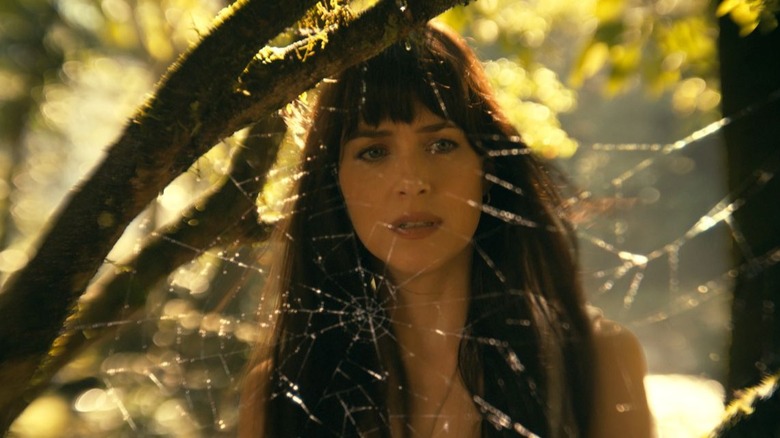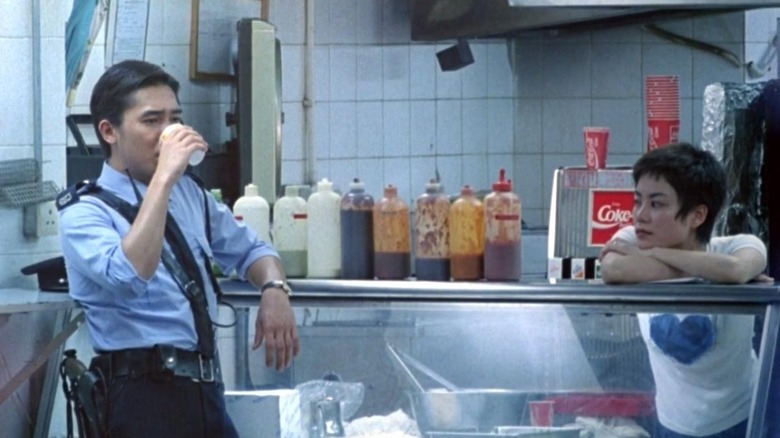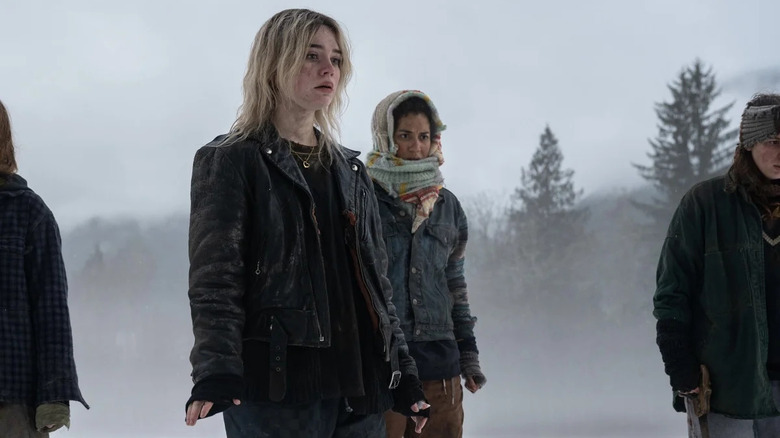What's That Song In The Madame Web Closing Credits? You Probably Know The Band
Oof, "Madame Web." Critics have savaged the latest Spider-Manless Spider-Man spin-off from Sony Pictures (read /Film's review here). Unlike the Sydney Sweeney picture I'm actually looking forward to this year, "Madame Web" is not "Immaculate." It's a hackneyed joke that in bad movies of this sort, the best part is when the credits hit. In "Madame Web," that's doubly true because you'll get to hear some nice music: "Dreams" by The Cranberries.
Released in 1992, "Dreams" is the Irish band's debut single, part of their first album "Everybody Else Is Doing It, So Why Can't We?" Dolores O'Riordan, The Cranberries' late singer, and guitarist Noal Hogan wrote the song about the experience of love. O'Riordan's whimsical brogue becomes a melody played against the soft rock instrumentals from her bandmates (Hogan, his bassist brother Mike Hogan, and drummer Fergal Lawler). It's not just a great love song, but a song about how it feels to be in love: the floating excitement, how the ground beneath you is shifting but leaving you unharmed, and the calm like you're in, well, a dream. For a companion piece, listen to Florence & The Machine's effusive 2007 "Drumming Song" (a rhapsody describing how love makes your heart beat like a drum).
In "Madame Web," the eponymous Cassandra Webb (Dakota Johnson) has clairvoyant visions. So, including a song outright titled "Dreams" is a halfway-inspired choice. As for the lyrics themselves not really fitting — I'm not going to give the "Madame Web" team too much credit.
This is far from the only (or best) movie to employ The Cranberries and "Dreams."
(California) Dreams in Chungking Express
Wong Kar-Wai's 1994 genre-blending "Chungking Express" is a slice-of-life anthology set in contemporary Hong Kong. The film's second half is a romance between Faye (Faye Wong), a restaurant worker who dreams of flying around the world, and a cop (Tony Leung) who always gets food at her workplace, Midnight Express.
In a Wong Kar-Wai film, people yearn — especially for love — and "Chungking Express" spotlights the melancholic yearning of people who feel directionless but are too young to be having a midlife crisis. There are two songs repeatedly used to emphasize Faye's feelings. One is "California Dreamin'" by The Mamas & the Papas (this one is mostly diegetic, with Faye listening to it on the radio as she works). The song represents, well, Faye's desire to fly to California (in one scene where the song plays, she literally dances around holding a toy plane).
The other is "Dreams," which represents her infatuation with Cop 663. The first time the needle drops on "Dreams," the film cuts to a slow-motion wide shot. 663 leans against a wall drinking coffee while on the other edge of the frame, Faye leans on a counter and gazes at him adoringly. The tell of how the song reflects Faye's feelings? The version of "Dreams" in "Chungking Express" is not The Cranberries' original — it's a Cantonese cover song by Faye Wong herself. Whenever "Dreams" plays in "Chungking Express," we're literally hearing the music of Faye's soul.
As documented by the Mubi Podcast, "Chungking Express" including "Dreams" skyrocketed Wong and The Cranberries with her to stardom in Hong Kong. A song's popularity transcending culture is a beautiful thing. Somehow, I don't think "Madame Web" is going to be what boosts The Cranberries' standing on Spotify.
The Cranberries' Zombie is everywhere
The "Dreams" continue (my colleague BJ Colangelo is partial to the song's usage in "The Next Karate Kid," where Buddhist monks discover new spiritual power in The Cranberries). However, my favorite Cranberries song is "Zombie."
Contrary to what some needle drops will make you think (*cough* "Army of the Dead" *cough*), it is not a Halloween song about the shambling undead. No, "Zombie" is a powerful anti-violence anthem about the dangers and shortsightedness of radicalization, written and sung by O'Riordan. The song is about The Troubles, a decades-long civil conflict in Northern Ireland during the 20th century. It's specifically inspired by a 1993 bombing that killed two children, but it's truly about the entire conflict and its historical roots (hence the lyric: "It's the same old theme since 1916," a reference to the Easter Rising). The title choice of "Zombie" suggests that this violence should have been put to rest long ago. Since it hasn't, more and more mothers have had to see their children die.
The song opens with a heavy guitar riff, but a melancholic one that feels like a dirge, and from there the repetitive beat and O'Riordan's howls of heartbreak. It's a simple message, but a flexible and tragically enduring one; right now, try to listen to the song and not think about all the innocent lives being taken in Gaza.
One of the more effective audiovisual uses of "Zombie" was in the Showtime series "Yellowjackets." The season 2 finale, "Storytelling," opens with the song and a close-up of Natalie (Sophie Thatcher), who is haunted by trading a child's life for her own. The mournful howls of "Zombie" are the sound of her guilt.
"Madame Web" is playing in theaters. However, I'd suggest just staying home and listening to some Cranberries albums for two hours instead.


